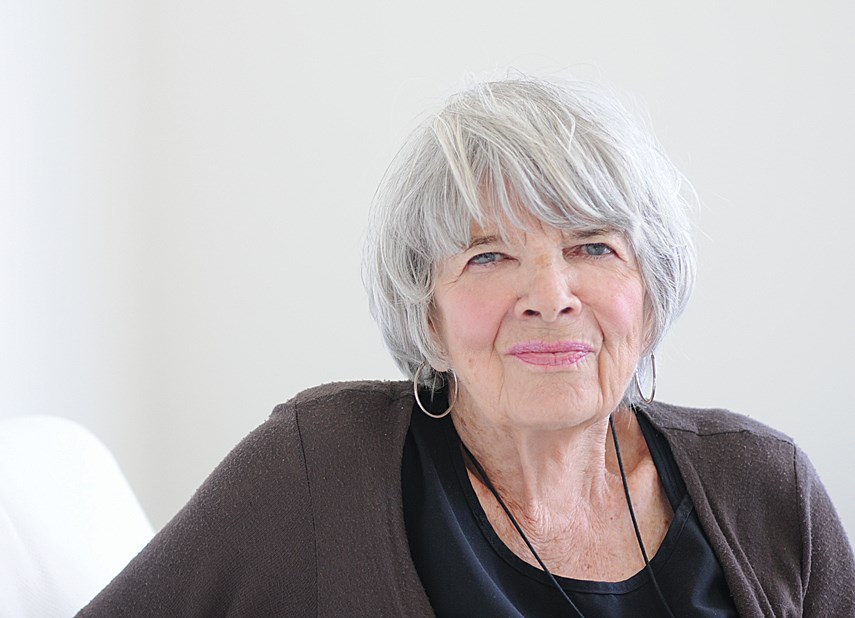Two weeks ago, June Earle celebrated her 85th birthday — with a baseball game.
Not just any game. It was a family affair.
“There were 20-some of us playing,” she says, “and we had so much fun we decided to make it an annual event. It’s been at least 70 years since I last played ball but as soon as I heard the smack of the ball and the bat, I thought, ‘I can do this.’ And I did, with my granddaughter as a surrogate base runner. It’s so interesting to me that so much memory was triggered by that game.”
Memory and how it works, especially as we age, is on June’s mind these days due to her volunteer work with the Special Services Society of West Vancouver.
Special Services is just that — special. A group of seniors started Special Services back in 1975 to support the community’s isolated seniors. Personal connections, they believed, and providing basic needs like transportation, would help them become active and involved. Forty-three years later, from a small office at West Vancouver Seniors’ Activity Centre, a group of volunteers continue to provide those special services. June is one of them.
Why does June give her time to Special Services when she could be organizing the family baseball game schedule?
“I have a big family, and yes, we are close. I go to yoga. I play bridge every week with friends. I have a full life and there never seems to be enough hours in the day. Why Special Services? It needs to be done, and I love doing it. It seems like a good fit.”
She joined the seniors centre for the yoga and tai chi classes. Eventually, through her friend Varick Ernst who ran the program until she retired last year, June learned about Special Services.
She began by visiting homebound seniors with Varick. “Really, the value for me comes from talking with these people, who are mainly women, and learning about the extraordinary lives they have lived. We have incredible conversations.”
Bunny Brown was recruited by Varick Ernst also, to step into her role as president of the society. “We’re grateful to West Vancouver Seniors’ Activity Centre for providing a central location for Special Services, and yet remain an independent entity. The challenge is to find the people who need our services. Once we do, it really takes very little to make a great difference in people’s lives. Personal connection, through phone calls and visits, fosters companionship and restores a sense of inclusion.”
People may not even realize they are isolated. The loss of friends, family and spouses over time leaves people without their lifelong support networks. These and other major life transitions can become their primary focus.
Last year, June found herself living alone for the first time in her life. A good friend told her: now you’re going to learn all about yourself. “It’s true,” says June, “even with my sturdy supports. I’m not driving anymore, for example, so it’s an adjustment for me to rely on family and friends to help me get around to shopping and appointments.
“I came to Special Services because I wanted to help improve quality of life for people who, for so many reasons, are home-bound. I found in reaching out my hand, their hands reached out to me. Together, we learn about the value of conversation, companionship and connection. Plus, they love telling their stories and I love listening to them.”
Reaching back into memory is a creative act. In listening to peoples’ stories over the past 11 years for this column, appropriately called Memory Lane, and in my work with seniors across the North Shore, I have learned that the creative process, whether it involves music, art, writing and remembering, is a major contributor to mental health and quality of life at this stage of life’s journey.
In fact, sharing our memories and stories in conversation can be considered to be prevention. Connection, companionship and conversation replaces the gradual creep of isolation with inclusion, participation and purpose. When people are heard, they remember they matter, they find ways to be useful and to contribute. And who doesn’t like to hear a good story?
If readers are aware of anyone who could benefit from Special Services, or may be interested in volunteering, call 604-925-7281, or drop in at West Vancouver Seniors’ Activity Centre and ask to speak with a Special Services volunteer.
Laura Anderson works with and for seniors on the North Shore. Contact her by phone at 778-279-2275 or email her at [email protected].



